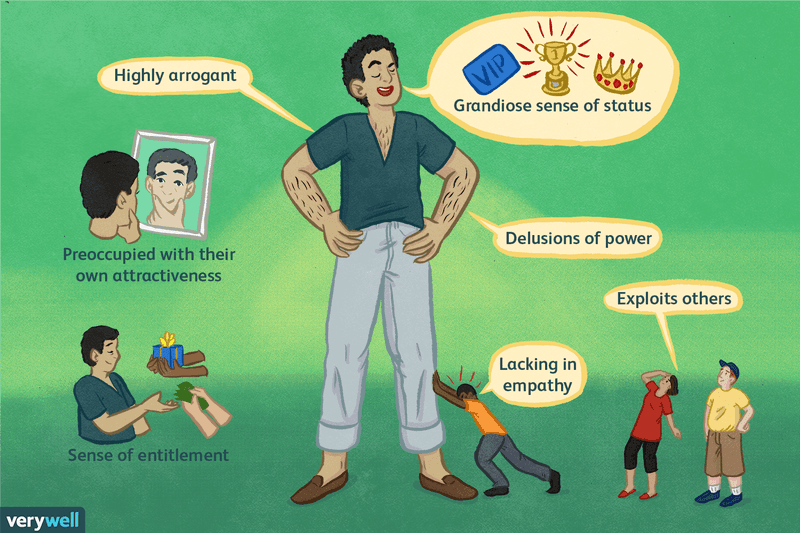20 Red Flags That Someone Might Be A Sociopath Or Psychopath
Understanding the subtle and overt signs of sociopathy and psychopathy can be essential for recognizing potentially harmful individuals in our midst. These disorders are characterized by specific behavioral patterns that can have significant impacts on personal and professional relationships.
From emotional detachment to manipulative behaviors, recognizing these red flags can help in navigating social interactions more safely and effectively.
1. No guilt after hurting others

Some individuals display an unnerving lack of guilt after causing emotional harm to others. This absence of remorse is often accompanied by a dismissive attitude, as if the feelings of others are inconsequential.
This behavior can manifest in both personal and professional settings, making interactions deeply unsettling for those involved. Without the weight of guilt, these individuals may repeat harmful actions without hesitation.
The inability to feel guilt is a hallmark of sociopathic or psychopathic tendencies, indicating a broader pattern of emotional detachment. Recognizing this trait early can be crucial in understanding the underlying motives of such individuals, providing insight into their true nature.
2. Chronic lying without reason

Lying is often a tool used by sociopaths and psychopaths to manipulate and control their environment. Unlike typical deceit, these individuals lie even when there’s no apparent reason to do so.
This behavior can confuse those around them, as the constant dishonesty creates an unpredictable environment. The lies are often elaborate, adding layers of complexity to their interactions.
This pattern of chronic lying is not just about the falsehoods themselves but about the pleasure derived from deceiving others. It is a behavior deeply embedded in their personality, reflecting an innate disregard for truth and trust.
3. Manipulating people for fun

For some, manipulation is not merely a means to an end but an entertainment form. These individuals see people as pawns in a game, deriving pleasure from controlling others.
Their manipulation is often subtle, making it difficult for even those closest to them to realize they’re being controlled. This behavior can deeply affect relationships, causing confusion and distress.
Such manipulation is a clear indicator of sociopathic tendencies, as it reveals an enjoyment in exerting power over others without regard for their well-being. Understanding this trait can help in identifying potentially harmful personalities early.
4. Superficial charm

A key characteristic of many sociopaths and psychopaths is their superficial charm. They are often exceptionally charismatic, drawing people in with their engaging demeanor.
However, beneath this charm lies a lack of sincerity. Their interactions are often calculated, designed to win trust and manipulate others to achieve their own ends.
This charm is a tool used to mask their true intentions, allowing them to navigate social environments with ease. Recognizing the superficial nature of this charm can be vital in identifying these individuals, preventing potential exploitation.
5. Blaming everyone else

One telling sign of a sociopath or psychopath is their tendency to blame others for their own mistakes or shortcomings. This behavior is often accompanied by a refusal to accept responsibility for their actions.
They deflect blame with ease, often turning the situation around to make others appear at fault. This manipulation can leave victims feeling guilty and confused.
By consistently blaming others, these individuals avoid accountability, maintaining a distorted self-image. Understanding this behavior is crucial in dealing with such personalities, enabling one to see through their manipulative tactics.
6. Lack of empathy

Empathy is a fundamental human trait, allowing us to connect with others on an emotional level. A lack of empathy is a significant red flag when it comes to identifying sociopathic or psychopathic individuals.
These individuals may appear emotionally detached, unable to understand or share the feelings of others. This can lead to interactions that feel cold and disconnected.
Their inability to empathize is not just a lack of emotion but a strategic tool, used to manipulate others without guilt or regret. Recognizing this absence of empathy is key to identifying potentially harmful relationships.
7. Love-bombing early in relationships

Love-bombing is a tactic used by sociopaths and psychopaths to quickly gain control over a new partner. They often overwhelm their target with excessive affection and attention early in the relationship.
This intense display can feel like a whirlwind romance, but it serves the purpose of creating dependency and attachment. Once the target is secured, the behavior often shifts.
Recognizing the signs of love-bombing can prevent emotional manipulation and help maintain healthy relationship boundaries. It is a strategy employed to establish dominance and control in personal relationships.
8. Controlling through fear

Fear is a powerful tool for those who seek to control others. Sociopaths and psychopaths often use intimidation to maintain power in relationships or professional environments.
This control tactic can manifest through aggressive behavior, threats, or even subtle intimidation. The objective is to create an atmosphere of fear and dependence.
Understanding this strategy is crucial for those who may find themselves in such environments, as recognizing these signs can help in reclaiming power and autonomy. It’s a method rooted in psychological manipulation and control.
9. Gaslighting as a regular tactic

Gaslighting is a form of psychological manipulation where the perpetrator sows seeds of doubt in the victim’s mind, making them question their memory or perception.
For sociopaths and psychopaths, gaslighting is a regular tactic used to destabilize their targets. This manipulation can leave victims feeling uncertain and reliant on the manipulator for reality checks.
Recognizing gaslighting is crucial for maintaining mental health and autonomy in relationships. It represents a deliberate effort to undermine and control another’s perception of reality, reflecting deep-seated manipulative tendencies.
10. Reckless behavior

Reckless behavior is a hallmark of sociopathic and psychopathic personalities. These individuals often engage in dangerous activities, showing little regard for their own safety or the safety of others.
This thrill-seeking behavior can manifest in various forms, from extreme sports to illegal activities. It reflects a broader pattern of impulsivity and disregard for societal norms.
Understanding the roots of this recklessness can provide insight into the psyche of such individuals, highlighting their need for stimulation and lack of concern for consequences. It’s a behavior that can put everyone at risk.
11. Thrill-seeking without concern

For some, the pursuit of thrills is an all-consuming passion, often undertaken without consideration for safety or consequences. This behavior is common among sociopaths and psychopaths, who seek excitement without fear.
Their disregard for danger can lead to risky situations, endangering themselves and others. This thrill-seeking is not just about the activity but the underlying need for stimulation.
Recognizing this pattern can be crucial in understanding the motivations and potential risks associated with such individuals. It’s a behavior that reflects a deep-seated need for excitement and a lack of fear.
12. Quick to anger, then calm again

A volatile temper, quickly flaring and then dissipating, is characteristic of many sociopaths and psychopaths. Their sudden outbursts of anger can catch others off guard.
These individuals often regain composure rapidly, leaving those around them confused and unsettled. This behavior is not just a lack of emotional control but a manipulative tactic.
Understanding this pattern can help in dealing with such unpredictable personalities, as it reveals an aspect of their emotional landscape that is both unstable and strategic. It’s an emotional volatility that serves a purpose.
13. Exploiting kindness

Empathy is a human trait often exploited by sociopaths and psychopaths. They take advantage of the kindness of others, using it as a tool for personal gain.
These individuals are skilled at identifying and manipulating empathetic people, often leaving them depleted and used. This exploitation extends beyond individuals to entire communities.
Recognizing the signs of such manipulation is crucial for protecting one’s emotional and mental well-being. It’s a calculated strategy that reflects a profound lack of regard for others’ generosity and compassion.
14. Violating boundaries repeatedly

For those with sociopathic or psychopathic tendencies, personal boundaries are mere obstacles to be ignored. They repeatedly violate these boundaries, often without remorse.
This behavior can manifest in many ways, from physical intrusion to emotional manipulation. The disregard for others’ limits is a key indicator of their disruptive nature.
Understanding this behavior is essential for safeguarding one’s personal space and well-being. It’s a sign of deeper issues with respect and empathy, reflecting a pattern of invasive and disrespectful actions.
15. No accountability

Sociopaths and psychopaths often exhibit a striking lack of accountability. When faced with the consequences of their actions, they deflect responsibility onto others.
This behavior not only disrupts group dynamics but also erodes trust and cooperation. It reveals a deep-seated unwillingness to acknowledge one’s own faults or mistakes.
Recognizing this pattern is crucial in understanding the mindset of such individuals. It reflects a broader disregard for personal responsibility, contributing to their overall manipulative and deceitful nature.
16. Uses people as tools

Viewing people merely as tools to achieve personal goals is a common trait among sociopaths and psychopaths. They manipulate others without regard for their feelings or well-being.
This behavior often leads to strained relationships, as individuals feel used and discarded once their utility is exhausted. It’s a fundamental aspect of their interaction style.
Understanding this tendency can help in recognizing and resisting manipulation. It reveals a profound understanding yet disregard for human emotions, treating relationships as transactions rather than connections.
17. Shifts personality in different settings

One hallmark of sociopathy and psychopathy is the ability to shift personalities depending on the environment. These individuals can appear charming and affable in one setting, only to reveal a darker side elsewhere.
This duality can be confusing for those who interact with them, as it masks their true intentions and nature. It’s a strategic adaptation to fit their needs.
Recognizing this behavior is essential for understanding the complex social dynamics at play. It’s a reminder that first impressions can be misleading, especially with individuals skilled in deception.
18. Ignores consequences

Ignoring consequences is a behavior deeply embedded in the psyche of sociopaths and psychopaths. They act impulsively, often without considering the potential fallout of their actions.
This disregard for the future can lead to destructive outcomes, affecting both themselves and those around them. It’s a pattern that reflects their impulsivity and lack of foresight.
Recognizing this trait can help in anticipating and mitigating potential harm. It highlights the need for caution when dealing with individuals who prioritize immediate gratification over long-term stability.
19. Always the “victim” in their stories

Sociopaths and psychopaths often cast themselves as perpetual victims, regardless of their actual role in events. This behavior is a manipulation tactic designed to elicit sympathy and deflect blame.
By portraying themselves as wronged, they gain control over others’ perceptions and emotions, allowing them to manipulate situations to their advantage.
Understanding this pattern is crucial for those who may find themselves emotionally entangled with such individuals. It reveals a strategic use of narratives to control and influence others, masking their true intentions.
20. Leaves a trail of broken relationships

A history of broken relationships is often a major red flag for sociopathy and psychopathy. These individuals tend to leave a trail of emotional destruction, moving from one failed connection to another.
Their inability to maintain stable relationships is a reflection of their manipulative and self-centered nature. Each broken bond tells a story of unmet expectations and emotional harm.
Recognizing this pattern can be vital for those evaluating the potential risks of engaging with such individuals. It underscores the importance of observing long-term relationship histories as part of personal assessment.







